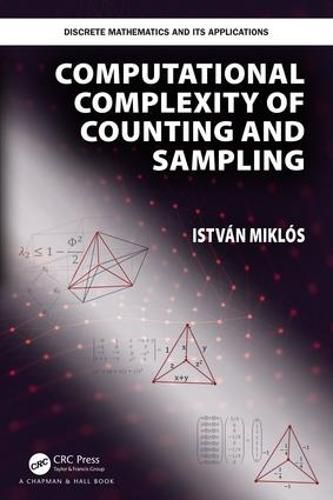Readings Newsletter
Become a Readings Member to make your shopping experience even easier.
Sign in or sign up for free!
You’re not far away from qualifying for FREE standard shipping within Australia
You’ve qualified for FREE standard shipping within Australia
The cart is loading…






Computational Complexity of Counting and Sampling provides readers with comprehensive and detailed coverage of the subject of computational complexity. It is primarily geared toward researchers in enumerative combinatorics, discrete mathematics, and theoretical computer science.
The book covers the following topics: Counting and sampling problems that are solvable in polynomial running time, including holographic algorithms; #P-complete counting problems; and approximation algorithms for counting and sampling.
First, it opens with the basics, such as the theoretical computer science background and dynamic programming algorithms. Later, the book expands its scope to focus on advanced topics, like stochastic approximations of counting discrete mathematical objects and holographic algorithms. After finishing the book, readers will agree that the subject is well covered, as the book starts with the basics and gradually explores the more complex aspects of the topic.
Features:
Each chapter includes exercises and solutions
Ideally written for researchers and scientists
Covers all aspects of the topic, beginning with a solid introduction, before shifting to computational complexity’s more advanced features, with a focus on counting and sampling
$9.00 standard shipping within Australia
FREE standard shipping within Australia for orders over $100.00
Express & International shipping calculated at checkout
Computational Complexity of Counting and Sampling provides readers with comprehensive and detailed coverage of the subject of computational complexity. It is primarily geared toward researchers in enumerative combinatorics, discrete mathematics, and theoretical computer science.
The book covers the following topics: Counting and sampling problems that are solvable in polynomial running time, including holographic algorithms; #P-complete counting problems; and approximation algorithms for counting and sampling.
First, it opens with the basics, such as the theoretical computer science background and dynamic programming algorithms. Later, the book expands its scope to focus on advanced topics, like stochastic approximations of counting discrete mathematical objects and holographic algorithms. After finishing the book, readers will agree that the subject is well covered, as the book starts with the basics and gradually explores the more complex aspects of the topic.
Features:
Each chapter includes exercises and solutions
Ideally written for researchers and scientists
Covers all aspects of the topic, beginning with a solid introduction, before shifting to computational complexity’s more advanced features, with a focus on counting and sampling